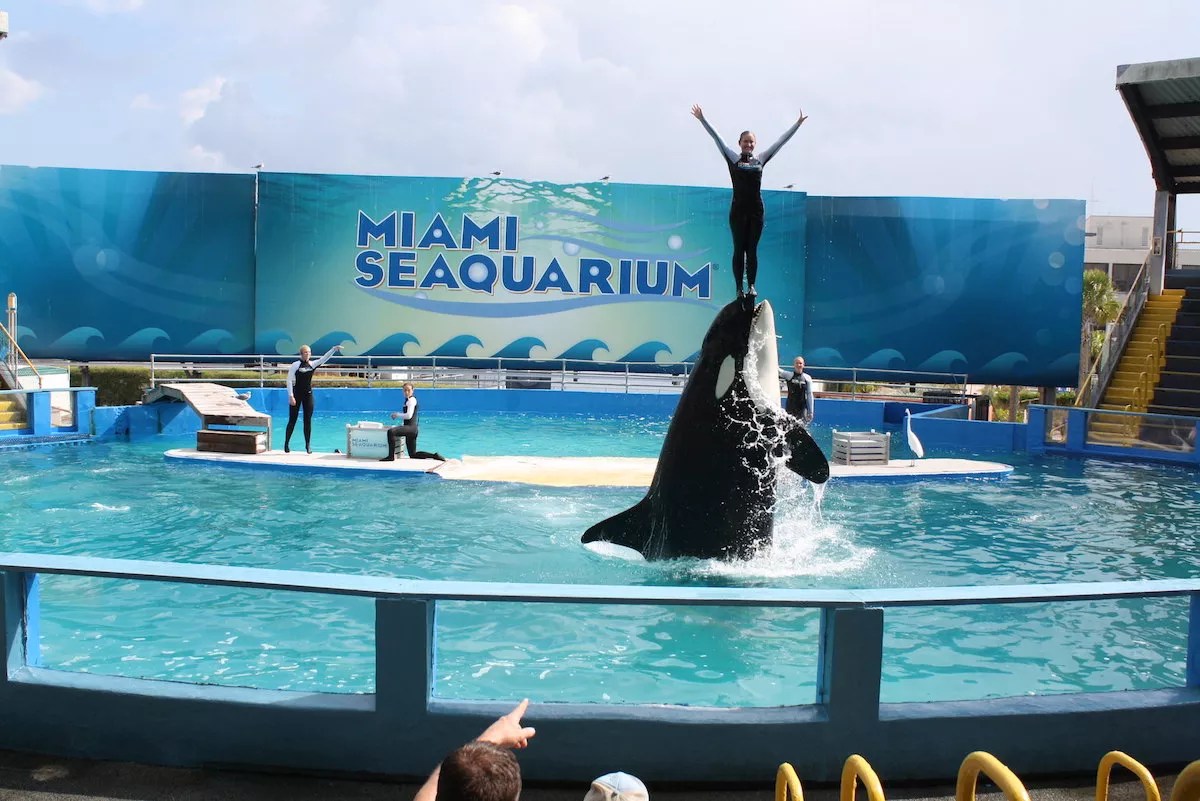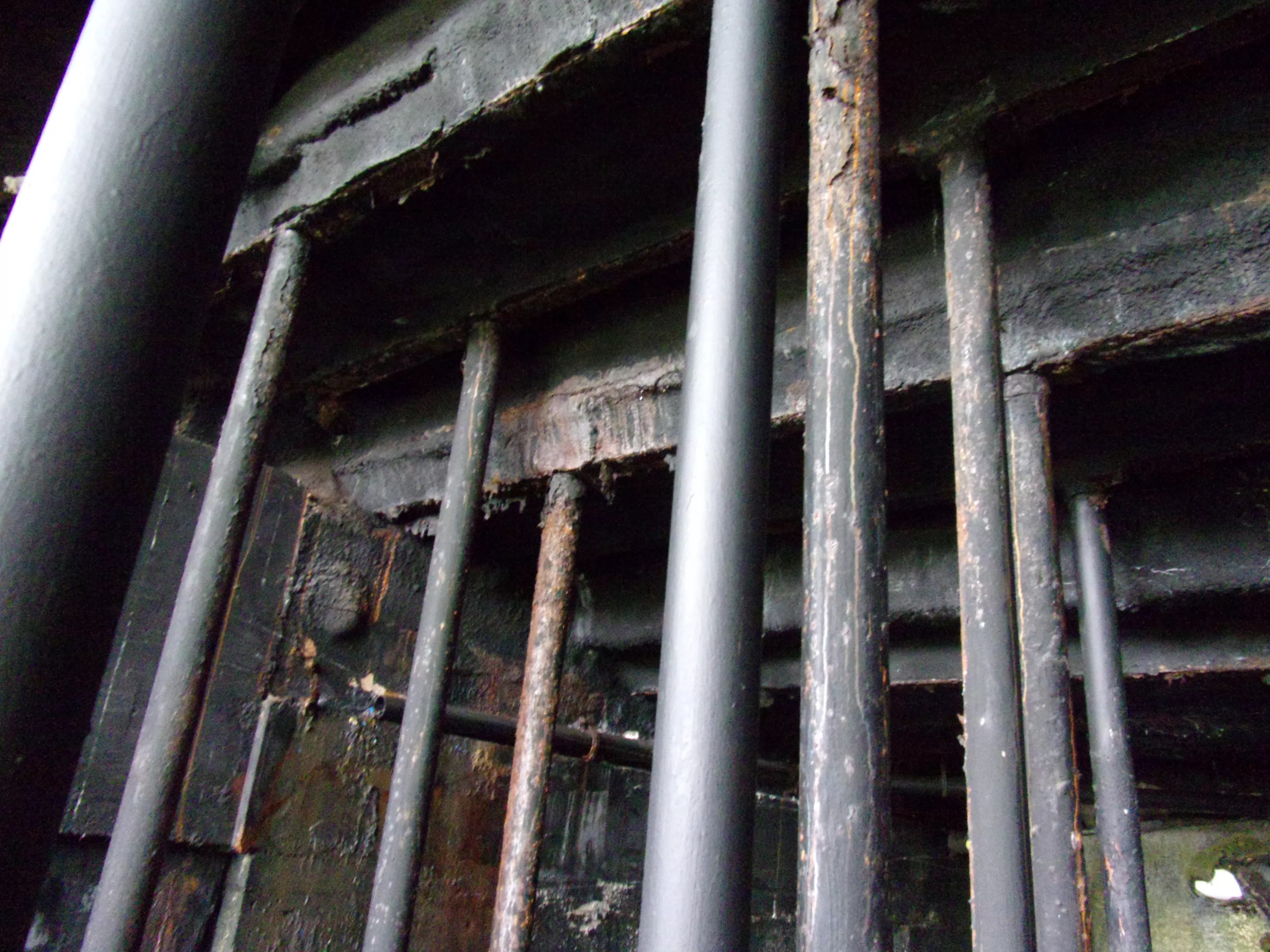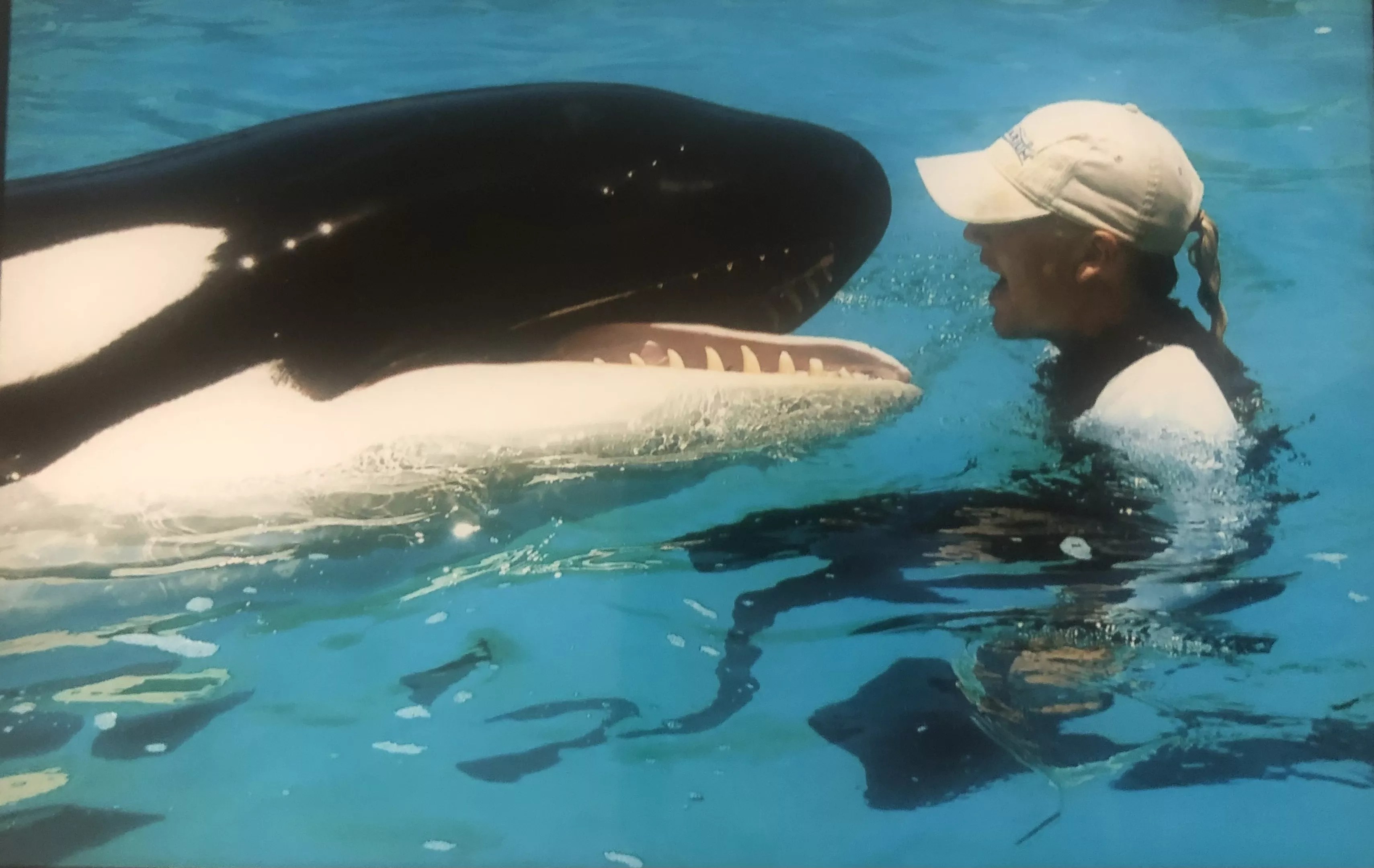

Audio By Carbonatix
As Miami Seaquarium workers raised the water level in Lolita’s whale tank after an urgently scheduled August 18 medical procedure, panic set in among the marine park’s staff.
The 7,000-pound orca was struggling to stabilize herself and swim on her own. As the water inched higher, she was floundering, and part of her jet-black tail appeared limp.
Having survived multiple hurricanes, nine U.S. presidencies, and five decades of repetitive performances under the pounding Florida sun, the Seaquarium’s retired star, already worn down from a chronic infection, was fading before her caretakers’ eyes.
“She was having trouble moving one fluke particularly. She was not as active as we would have liked. She was clearly uncomfortable, listing to one side,” a source, who was present for the procedure and has knowledge of Lolita’s condition and care, tells New Times.
Compounding the crisis, a bulkhead used to raise and lower water levels during medical procedures was leaking.
“We began to lower the water again, and there was concern that with the leaking through the bulkhead, it would not lower as quickly as needed. But it did. We were able to get the water down,” recounts the source, who spoke on the condition that their name not be published out of fear of reprisal.
A whale-size stretcher was brought in to stabilize Lolita while veterinarians scrambled to control her vital signs and irregular breathing. But the orca never recovered, and around four o’clock that afternoon, Lolita was declared dead.
Miami Seaquarium released a statement saying that “despite receiving the best possible medical care,” the orca, thought to be 57 years old, died from “what is believed to be a renal condition.”
The marine park’s statement did not mention the medical procedure immediately preceding her death.
By all accounts, Lolita had been struggling in the two days prior. She had trouble eating and appeared languid – symptoms that prompted her veterinarians to schedule the August 18 procedure, which involved drawing blood and administering medication and fluids.
The timing of her death has nonetheless raised questions about what prompted the fatal collapse.
Magdalena Rodriguez, Lolita’s former veterinarian of more than 20 years, says medical examiners should be “highly suspicious” that the medical procedure and subsequent complications might have precipitated the whale’s death.
Rodriguez explains that orcas are what is known as “conscious breathers,” meaning they need to make a voluntary move to the surface to breathe through their blowhole, which is akin to a nostril. If a killer whale falls unconscious or becomes incapacitated for an extended period while submerged, it will drown.
“After a medical procedure, where you lower and then re-raise the water, you have to make sure that the whale is breathing well. If the animal was struggling, the water needed to go back down fast,” Rodriguez says.
Rodriguez was not present for the procedure. The Seaquarium’s previous owners fired her in 2021 after she alleged that the park was endangering its animals by reducing their diets, among other issues. Her complaints were documented in a 2021 inspection report filed by the U.S. Department of Agriculture (USDA), which oversees captive animal exhibits.
“We know she was sick,” Rodriguez says of Lolita’s final day. “But it was a cascade of things going against her. She likely was losing consciousness, having trouble breathing.”
The source who witnessed Lolita’s death says the whale had undergone several similar medical procedures without incident.
“We assumed she’d have the same positive response she’d had previously when treated this way,” the source says. “The days leading up to this did not indicate this level of illness. There were blood tests. There were all the things that we review and inform the treatment for the vets. There is nothing that was done that was ill-advised or in any way reckless and without thought and consideration.”
Two sources with knowledge of Lolita’s treatment that day say blood was coming from the area around her mouth following the medical procedure, which Rodriguez says warrants investigation for possible hemorrhage or adverse reaction to medication.
A necropsy was reportedly scheduled to be performed in August at the University of Georgia, but the results have not yet been publicly released.
“Very Stable”
The announcement of Lolita’s death shocked many, as the whale (also known as Tokitae or Toki) appeared on track to be released into a marine enclosure north of Seattle in the Salish Sea, where she was captured as a calf.
Jim Irsay, the billionaire owner of the Indianapolis Colts, had pledged to fund the project, the nonprofit group Friends of Toki was negotiating plans to build out the Salish Sea sanctuary, and Lolita was starting a training regimen to acclimate to a stretcher that would be used during the transport.
On July 9, Tom Reidarson, a lead veterinary consultant who works for the Seaquarium, said in a public statement that Lolita was in “as good a clinical condition as I’ve ever seen her.”
“We’ve had our ups and downs. She was quite sick in October of 2022 and recovered quickly. She had a slight setback about a month ago and again recovered quickly. All of her parameters are near normal,” Reidarson said.
Three days before Lolita’s death, on August 15, the Seaquarium assured the public that the whale’s health was improving and that the much-anticipated relocation project was moving along. The marine park described the orca as “very stable” and “as good as she can be” for her age.
“Thanks for sharing the dream,” the park stated.
Yet veterinary reports indicated a more nuanced assessment. Weeks earlier, Friends of Toki’s health report noted that Lolita was “still fighting infection.”
“During July, Toki’s condition has remained relatively stable. She is currently experiencing another bout of abdominal/stomach discomfort, which has improved in the last 24 hours and we hope to resolve within the next few days,” the July 31 report reads.
While the project to free her was in the works, Lolita lived in her small tank alongside a Pacific white-sided dolphin named Li’i, out of public view. The whale stadium had been shut off from public access, and shows had been halted after Miami-Dade County issued an unsafe structure notice to the park’s prior owner, Palace Entertainment, in the summer of 2021. At that time, county inspectors noted the stadium’s deteriorating structural elements, including corroded beams.
According to the 2021 USDA report, paint and laminate were flaking off the whale’s tank, and the water filtration system was antiquated. Lolita was confined to the tank from 1970 up until her death.
Depending on how one measured the tank, whether the connected medical pool in the back was included in the dimensions, Lolita’s living space violated minimum size requirements for a killer whale habitat under federal law, according to the USDA.
After the Dolphin Co. took over the park in 2022, the company pledged to work with Friends of Toki to upgrade Lolita’s tank and switch the filtration system from chlorine to ozone to improve the water quality. Notwithstanding the Seaquarium’s optimistic prognosis this year, several monthly veterinary reports in 2023 indicated that Lolita remained on a heavy dose of antibiotics to hold the chronic infection at bay.
Some animal-rights activists called for her immediate transfer to a better equipped park, contending that her tank conditions remained abysmal and were to blame for her failing health and chronic infection. Phil Demers, an outspoken animal activist currently steeped in a legal dispute with Miami Seaquarium over his use of drones to secure aerial footage of Lolita, warned that the orca would die if left in the crumbling tank for much longer.
“We can’t continue to wait for a whale utopia to be built and wait for optimal conditions for her to enter this utopia. The longer we wait for perfection, the likelier it becomes that she is going to die,” Demers told New Times in March 2023.

County inspectors identified corrosion in the whale stadium at Miami Seaquarium in the summer of 2021.
Miami-Dade County photo
Lolita’s Final Hours
Lolita stopped eating shortly after Seaquarium’s August 15 statement describing her as “very stable,” according to two sources who have knowledge of her treatment.
In response, Reidarson and other veterinarians working with Seaquarium and Friends of Toki scheduled the medical procedure for the morning of August 18 in the medical pool behind the whale’s main living quarters.
The bulkheads were deployed, allowing the water level where Lolita was isolated to drop enough for veterinarians to administer fluids and medication. (The Seaquarium has not released the name of the medication; Reidarson did not respond to an October 3 email requesting comment.)
When Lolita fell seriously ill in October 2022, the Seaquarium carried out a similar procedure in the same pool without significant complications, according to veterinary reports.
Still, Rodriguez points out that Lolita was well aware of what was in store for her when the water began to go down, and that it was a stressful experience for the orca.
She explains that the tank’s water chillers had to be working properly to keep the whale cool during this type of procedure and that her condition had to be closely monitored to ensure that she remained alert enough to breathe – especially if she had been treated with medications that could cause drowsiness.
When the bulkhead started leaking early in the day on August 18, fear spread among some staff that they would be swallowed up by water rushing back into the medical pool, though others in the pool didn’t deem it an imminent danger, according to the source who recounted the events of the day to New Times.
Later, after the medical procedure wrapped up and the water was raised, attendants noticed something was clearly wrong with Lolita.
“The water was being raised, and as it got to a level that she was floating, buoyant, she began to move around. It’d always been a little slow when she was recovering from a medical procedure, but she was slower than we had seen the previous time we did this,” the source says. “The most experienced of the attendants moved in to help her. She wasn’t responsive for several minutes, and we became more concerned.”
Although the leaking bulkhead prompted worries among Seaquarium staff that the water would not be lowered in time to try to revive the whale, the source maintains that the leak did not create a long delay.
Rodriguez says that alert veterinarians and trainers can deal with a malfunctioning bulkhead, but if a leak is big enough, she contends, it could be a “major problem” if a whale is not recovering and water needs to be lowered on an emergency basis.
The vet adds that the investigation into Lolita’s death ought to include a pharmacology panel to determine the level of medications in her body at the time of her death, including the potential presence of sedatives such as tramadol, which was sometimes administered to Lolita when she was ill. Rodriguez says that severe peptic ulcers and other potential digestive conditions need to be considered, given that veterinary reports indicated Lolita was suffering gastrointestinal problems in the weeks before she died.

Shanna Simpson worked as a trainer with Lolita for six years at the Miami Seaquarium.
Shanna Simpson photo
Unanswered Questions
According to an NBC 6 report, the Seaquarium said 15 clinicians and pathologists were assigned to the necropsy, “all with great expertise in their fields.”
The Seaquarium has not announced a date for the release of the necropsy results. The park said in August that the whale’s remains would be cremated and shipped west in a process overseen by the Lummi indigenous tribe, which views the whale as a sacred creature.
In early October, the National Oceanic and Atmospheric Administration’s (NOAA) Fisheries released a statement saying that the Seaquarium had not given NOAA the necropsy results and had no legal obligation to do so. NOAA Fisheries, which enforces the Endangered Species Act under which Lolita was protected, said that in September, the Seaquarium provided the agency with Lolita’s purported cause-of-death, which the agency did not disclose in its statement.
According to Whale and Dolphin Conservation USA, more than 50 captive orcas are scattered around the world, more than half of which were born in captivity. In 2016, SeaWorld stopped its orca breeding program as public outcry mounted against whale captivity and exhibitions. Kiska, the last captive orca in Canada, died at MarineLand in March, roughly three weeks before Miami Seaquarium announced its deal with Irsay to transport Lolita.
Looking back on Lolita’s final days, Rodriguez wonders whether the rosy portrayals of the whale’s health were little more than lip service to feed into the narrative that the orca was finally on the verge of freedom.
“Either they misled the world to think she was healthy, or they were really clueless about it and thought she was really healthy when she was sick and immunocompromised,” Rodriguez asserts. “She died an awful, agonal death and did not deserve that.”
The source who witnessed Lolita’s last hours agrees that the ordeal was devastating, with so much hope on the line and the project to release her in the works.
But the whale’s ability to persevere in her small tank for all those years was and remains a testament to her will to survive, the source says. Lolita outlived nearly every other orca captured during an era when hunters would wrangle juveniles and sell them to the highest-bidding marine park.
“Lolita found a way to live in a place that everyone now seems to agree she should never have been, was way too small. Something about her and her will to live was palpable when you were with her and just made you fall in love with this animal,” the source says. “For so many people around the world, this whale became iconic. It’s like you’re treating your mother, grandmother, your sister. We were remarkably and appropriately optimistic about her future. But it did take a serious turn.”